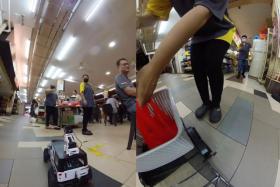'Energy islands' to produce solar power
'Energy islands' initiative may set up solar panels off Singapore coast
Singapore, a sunny island set in the sea, as a song goes, may soon have "islands" of solar panels floating in its coastal waters.
These will supply electricity to nearby industrial zones or living areas under a project by the Solar Energy Research Institute of Singapore (Seris), at the National University of Singapore (NUS).
This "energy islands" initiative was one of three projects launched yesterday as Seris marked its 10th anniversary at an event at the NUS Shaw Foundation Alumni House. Details of these "energy islands" are not available yet.
There are already floating solar panels here, but in a reservoir. The floating photovoltaics (PV) testbed in Tengeh Reservoir is the world's largest and is run by Seris, PUB and the Economic Development Board.
The Government plans to have PV testbeds in other reservoirs in the next few years.
Seris is also working on a project over the next 10 years with Nanyang Technological University and the National Research Foundation's Campus for Research Excellence and Technological Enterprise to develop more efficient solar cells that can convert 30 per cent of the sunlight they absorb into energy - surpassing the world record of 26.6 per cent.
Seris' third project is to develop cheaper and more efficient solar panels that can be integrated in building facades.
In a statement to congratulate Seris, Deputy Prime Minister Teo Chee Hean said: "For us, we do not have many alternative energy options and solar PVs are presently the most technically and economically viable."
The cost of solar energy has fallen by about 85 per cent in the last decade, and it is now a competitive alternative to fossil fuel-based power in many countries, including Singapore.
Mr Teo said Singapore is in a position to trial cleantech solutions, which can be scaled for other cities in the Asia-Pacific.
At the event, Seris' chief, Professor Armin Aberle, said the institute has had several breakthroughs, flowing research funds and an elite research team. But he noted that there are challenges for the future of solar energy in Singapore.
Given the oversupply of electricity here, there is no impetus for companies to venture into solar energy, he noted.
"Another problem is that most Singaporeans live in HDB flats and do not own rooftops, so they are a little disconnected from being able to produce their own solar electricity," he said.
But he believes that innovative measures that make it easy to produce and sell solar electricity can turn things around.
"This in turn will help Singapore to achieve its carbon emission targets, and at the same time provide a clean, green and healthy environment for future generations," he said.
Get The New Paper on your phone with the free TNP app. Download from the Apple App Store or Google Play Store now



